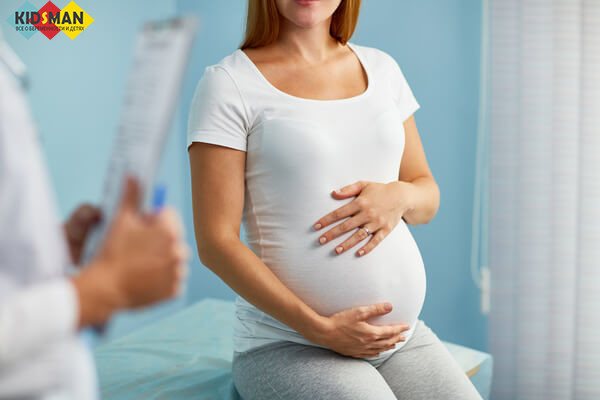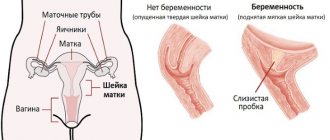Constipation during pregnancy is a common pathology among women. According to statistics, this is a problem for every second pregnant woman. This delicate difficulty is caused by anatomical, physiological and hormonal “upheavals” in the body of the expectant mother. If you keep the situation under control and prevent it from becoming chronic, then “horrible” trips to the toilet will bypass you. To do this, let's find out the causes of constipation during pregnancy and find out how to protect yourself from such difficulties.
Constipation during pregnancy: why does it happen?
The physiological norm is to have bowel movements 1-2 times a day, sometimes every other day. The absence of a bowel movement for more than three days is considered constipation. In order to eliminate constipation, you need to find out what exactly provokes it. Depending on the stage of pregnancy, the reasons may be completely different, and the therapy will also differ.
In the first trimester, constipation can be caused by the following factors:
- Progesterone - its concentration in the first weeks of pregnancy is very high. It acts on the intestinal muscles and they relax (hypotension). Thus, feces are retained in the rectum. This phenomenon is called atonic constipation.
- Excess potassium and iron - these elements in excess contribute to difficulty defecating. They can come in both food and vitamin-mineral complexes for pregnant women.
- Low physical activity - this happens if a woman is assigned to bed rest due to the threat of miscarriage.
From the second trimester until the end of pregnancy, the causes of constipation become slightly more numerous:
- Pressure of the uterus on the intestines - the fetus grows, and the internal organs are displaced. The digestive tract suffers the most, so the regularity of bowel movements becomes disrupted.
- Fluid deficiency - the less water, the more difficult it is for solid feces to pass through the intestines. With severe swelling, a woman has to limit her water intake, and constipation occurs.
- Hemorrhoids, anal fissures, a history of proctitis - such diseases are quite painful and often cause constipation.
- Poor nutrition - overeating, craving for “tasty” foods, a long break between meals during toxicosis occupy the first place among the causes of constipation.
- Pathologies of the intestinal structure are congenital defects that cause chronic constipation.
Do you know...
The psychological state of a pregnant woman also affects digestion. Avoid unnecessary worries and fears, as they provoke spastic constipation.
Causes of constipation during pregnancy
For representatives of the fair half of humanity who are expecting a baby, the causes of constipation can be different:
- Increased progesterone levels. The hormone has a relaxing effect on the intestinal muscles (peristalsis is disrupted, hypotension occurs).
- Lack of microelements. Constipation during early pregnancy can be caused by iron and calcium. These useful microelements are necessary for pregnant women. Doctors even sometimes specifically prescribe medications containing iron and calcium.
- Sedentary lifestyle. Some people, if there is a threat of miscarriage, go to bed rest. It is low physical activity that can cause constipation.
- Lack of fluid leads to the fact that bowel movements may be slow and difficult.
- Discomfort . Constipation during pregnancy can also occur due to diseases of the anal area. For example, an anal fissure or hemorrhoids can be the cause of this unpleasant phenomenon.
- Stress . They arise due to physiological changes in the body, fear of childbirth, thoughts about upcoming sleepless nights and other worries. Experiences negatively affect the frequency of bowel movements.
Constipation in early pregnancy
In the first trimester, expectant mothers often suffer from problems with bowel movements. A specific cause of constipation in early pregnancy may be toxicosis. Due to nausea and malaise, a woman eats and drinks little, which reduces the amount of feces and causes dehydration.
Some mothers, having learned about pregnancy, exclude physical activity, or are forced to do so due to severe toxicosis, which literally confines them to bed. It also does not promote timely bowel movements.
Constipation in late pregnancy
The closer the birth is, the more stress the expectant mother’s body will experience. This is also reflected in the gastrointestinal tract. The grown baby in the uterus puts pressure on the intestines, making it difficult to work.
In addition, the causes of constipation in late pregnancy can be: changes in hormonal and emotional levels (many mothers are anxious in anticipation of childbirth), poor drinking regimen due to edema, and decreased physical activity.
Treatment of constipation: how to cope?
You shouldn’t deal with such a problem as constipation on your own during pregnancy. The first thing you need to do is go for a consultation with a doctor. He will help you figure out what the cause is and recommend safe treatment. First, you will need to adjust your diet and drink more fluids. If the situation is consistently bad during the week, then you will need to take medications.
Allowed laxatives
There are many available and safe laxatives to treat constipation during pregnancy:
- Drugs that irritate the intestinal walls - Sena-de, Gutalax, Dulcolax, Defenorm.
- Osmotic substances - Duphalac, Normolakt, Lactuvit, Magnesium sulfate.
- Agents that stimulate intestinal motility - fiber, bran, plantain and flax seeds.
- Stool softeners - Tranzipeg, castor oil, mineral oils.
- Microclysters and suppositories - glycerin and sea buckthorn suppositories, Microlax.
Advice! Osmotic laxatives are made on the basis of a natural disaccharide - lactulose. These are the safest drugs that do not interfere with the absorption of beneficial nutrients, normalize the microflora in the intestines and have a mild laxative effect.
How can traditional medicine help?
In the arsenal of traditional medicine there are several excellent remedies for constipation during pregnancy. But how to deal with constipation during pregnancy without resorting to medications? It turns out that it is not only simple, but also delicious:
- infusion of prunes (not smoked!) - take 2 tbsp. l. prunes and pour two glasses of boiling water. Let it brew for 24 hours. This period can be significantly reduced if you use a thermos. Take 100 mg on an empty stomach;
- if constipation is accompanied by flatulence, treat yourself to herbal tea made from chamomile, mint, dill seeds, cumin or fennel;
- classic recipe for constipation - a glass of warm water with a spoonful of natural honey on an empty stomach;
- dried fruit compote (dried apricots, prunes, raisins);
- a decoction of beets, prunes and oatmeal, taken in equal proportions. Pour the finished mixture with water and cook for about an hour. Then take one glass an hour before bedtime.
Important! All traditional methods, no matter how harmless they may be, should be used in consultation with a doctor.
Constipation during pregnancy: how dangerous is it?
Irregular, difficult bowel movements are not only unpleasant, but also dangerous for you and your unborn baby.
Why you should fight constipation:
- With irregular bowel movements, harmful and toxic substances begin to accumulate in the intestines, they are absorbed into the blood and begin to poison the body.
- Constant pain, heaviness in the lower abdomen - discomfort negatively affects the psycho-emotional state.
- If you have constipation, you have to push, which can cause a miscarriage, the development of hemorrhoids, or an exacerbation of the disease.
- Lethargy, apathy, loss of appetite, nausea, irritability.
- Peeling, yellowing and sagging skin.
- Avitaminosis.
- An imbalance of microflora, an increase in the number of pathogenic microbes that can enter the child’s body during childbirth. This can cause the development of dysbiosis, colic, and problems with stool in your baby.
With constant constipation, the functioning of the digestive system is disrupted - inflammatory processes and colitis occur; all these diseases, against the background of weakened immunity during pregnancy, can become chronic.
How to do without laxatives
Laxatives, especially those based on synthetic components, aggressively affect intestinal motility and irritate its receptors. Such “violent” activity in the stomach can provoke increased uterine tone, and the chemical composition of tablets or drops can affect the development of the embryo. Therefore, it is better to try all alternative methods of eliminating constipation and only in extreme cases begin drug therapy.
Diet for constipation during pregnancy
What a pregnant woman eats affects both her condition and the health of the unborn baby. This is a very important point. Therefore, it is worth knowing what you can eat for constipation during pregnancy and how to balance your diet.
Products indicated for women suffering from constipation:
- salad mixes from raw vegetables and fruits;
- vegetable stews, caviar (squash, eggplant);
- beets, sauerkraut (not sour), all kinds of vegetables, raw and boiled;
- oil (olive, sunflower, flaxseed);
- savory baked goods, wholemeal bread, whole grain bread;
- soups (not broth);
- lean fish and seafood;
- plums, melons, apricots, kiwis, figs and all dried fruits;
- turkey, chicken meat;
- porridge (except rice and corn grits).
Why is it better to refuse or sharply limit consumption:
- baked goods, fresh white bread;
- manna and rice porridge;
- pasta;
- canned food and preserves;
- eggs (fried and boiled);
- fatty meats;
- fats (animal and culinary);
- tea, coffee, cocoa, chocolate;
- horseradish, black pepper, onion, garlic, radish, radish, mushrooms;
- fatty sauces, mayonnaise;
- marinades;
- jelly.
Advice! To protect yourself from constipation, you should get plenty of fiber from your diet. Sometimes a woman simply cannot eat a lot of vegetables and cereals. In this case, you can buy dry fiber at the pharmacy and add 1 teaspoon to yogurt or kefir.
Physical activity for constipation during pregnancy
Probably, women have a question about how to avoid constipation during pregnancy with the help of physical activity. The answer is very simple and concise: physical activity stimulates digestion and the process of cleansing the intestines. If your health allows, then walk more, do simple gymnastics, go to the pool. A great option is group yoga or Pilates classes for pregnant women.
Advice! Pregnant women are recommended to go for a 30-minute walk every day.
Drinking for constipation during pregnancy
Sufficient water intake prevents constipation. The ideal amount of fluid consumed is 1.5-2 liters. This includes water, juices, tea, fermented milk products, first courses. If a pregnant woman is prone to edema, this amount is reduced to 1-1.5 liters.
Gymnastics and massage for constipation during pregnancy
For women, in order to prevent constipation, there are special exercises that can be easily performed at home at a convenient time. The duration of such gymnastics is 10-15 minutes a day.
How to do gymnastics:
- Alternate relaxation and tension of the anal sphincter for 30 seconds.
- Do 10 smooth squats while holding onto a chair.
- Do several pelvic lifts while lying on your back with your knees bent.
- In the same position, stretch your left hand to your right knee, and then vice versa.
- Exercise “scissors” and “bicycle” 10 times.
Important! You can do gymnastics in the absence of any complications during pregnancy.
Acupressure helps normalize the process of defecation. Place three fingers below your navel. Below them is an acupuncture point responsible for digestion. You need to press it 40 times a day.
How to get rid of severe constipation during pregnancy?
Eat foods containing fiber:
- bran (up to a spoon per day),
- whole wheat bread,
- cereals,
- apples,
- kiwi,
- beet,
- broccoli,
- legumes
Drink vegetable and fruit juices, boiled water with lemon or honey on an empty stomach. Herbal or fruit tea. Eat raw vegetables and fruits, dried fruits - plums, raisins, apricots, figs, cranberries. You can also consume drinking yoghurts and kefir.
Drink at least 1.5 liters of water per day - excluding coffee or tea. Active recreation - a 20-minute walk or half an hour in the pool should help.
ALSO INTERESTING TO READ: How to apply for alimony
Consequences of constipation during pregnancy
Neglecting constipation during pregnancy is very risky. Firstly, the woman suffers from severe physical and psychological discomfort. Secondly, irregular bowel movements have a bad effect on a woman’s health. In addition, cramping pain often occurs due to constipation during pregnancy.
Why is constipation dangerous during pregnancy?
- the woman feels unwell (headache, nausea, irritability);
- deterioration of skin condition (flabbiness, yellowness, peeling);
- inflammatory processes in the rectum;
- intoxication of the body with feces;
- hemorrhoids, anal fissures;
- disturbances in the functioning of the biliary tract;
- impaired absorption of nutrients in the stomach;
- hypertonicity of the uterus;
- threat of miscarriage;
- negative impact of laxatives on fetal development.

Why can constipation occur during pregnancy?

Stress may be one of the causes of constipation in pregnant women
There can be many common reasons that can “accompany” most of pregnancy, causing constipation. So, among them are:
- sedentary lifestyle of pregnant women due to changes in physiological state. Many women unreasonably perceive pregnancy as some kind of illness, so they try to lie down more and show less physical activity. But it happens that bed rest has to be observed when there is a threat of miscarriage;
- lack of fluid if the expectant mother neglects the importance of this point in nutrition; defecation is slow and difficult;
- change in food preferences - often pregnant women want to eat more baked goods or sweets and, on the contrary, they forget about the need to eat enough fruits and vegetables. And this also leads to unhappy results;
- stress, which is especially characteristic of the female body during this period due to physiological changes, anxiety before childbirth, worry about one’s health and the expected baby, as well as other worries - all this does not have the best effect on the frequency of bowel movements;
- diseases. So, the cause may be hemorrhoids or anal fissure.
Constipation in early pregnancy, causes
The causes of constipation may also vary depending on the stage of pregnancy. In particular, in the early stages it may be:
- an increase in the amount of the hormone progesterone in a woman’s body, which has a relaxing effect on the intestines. In general, progesterone acts on the muscles of the uterus, reducing its contractility. However, there is also a side effect - along with the uterus, the intestinal muscles also react to this, which leads to a slowdown in peristalsis: feces take longer to move to their final destination. Along the way the feces move to the final destination, additional absorption of water occurs in the rectum, so the feces become hard and dry, they gradually accumulate in the rectum and, during bowel movements, often injure the mucous membrane;
- side effect of taking medications containing calcium and iron. Often, gynecologists specifically prescribe medications containing these beneficial substances to pregnant women if low hemoglobin levels are detected.
Constipation in later stages
The influence of the hormone progesterone on the growing uterus in mid-pregnancy and later stages, of course, is not canceled. However, the following factors that provoke constipation are also added:
- fetal growth. In this regard, the uterus enlarges, the intestinal loops shift and the space where they are located narrows. As a result, peristalsis and regularity of visiting the toilet are disrupted;
- fear of edema. A woman may deliberately reduce the amount of fluid she drinks due to fear of swelling. But water deficiency negatively affects the digestive process;
- small physical activity. Late stages of pregnancy are characterized by the fact that it becomes increasingly difficult for a woman to move due to an enlarged belly; she gets tired faster and, accordingly, tends to rest more. She simply cannot be physically active enough. Therefore, peristalsis worsens even more, which leads to fecal stagnation;
- fear of straining. The closer the birth gets, the more fear many women have about going to the toilet. They are afraid to strain their abs, thinking that a child might unexpectedly be born. For this reason, many pregnant women try to endure the urge to defecate, unable to easily go to the toilet “for the most part.” And this is fraught with drying out of the feces and only further worsens the woman’s situation. Whether it is possible to push also depends on the initial condition of the pregnant woman. Increased intra-abdominal pressure should be avoided by women who are at risk of miscarriage or premature birth.

Constipation in late pregnancy can be dangerous for the baby, so it is best to seek help from a doctor
Timely prevention of constipation during pregnancy
Constipation during pregnancy is fairly easy to prevent. Following several rules, starting from the first days of pregnancy, will protect you from digestive problems:
- Create a complete menu, preferably with a nutritionist or your doctor.
- Receive only positive emotions.
- Lead an active lifestyle that is acceptable for pregnant women.
- Drink enough fluids.
So, if you are caught off guard by constipation during pregnancy, you already know what to do. Find out the cause and choose a method to solve the problem that is suitable for you. And don’t let “intestinal” problems spoil your mood during such a tender and dear period for any woman.
How to cure constipation during pregnancy
Almost all drugs with a laxative effect are contraindicated for pregnant women. If you experience heaviness in the abdomen, pain, increased passage of gases and defecation less than once every 1-2 days, you should seek the advice of a gynecologist. Only a doctor can prescribe medications that will not have a detrimental effect on the course of pregnancy and will not harm the health of the fetus. You can try to normalize your diet and increase physical activity on your own. These measures are often enough to improve bowel function and alleviate the condition.
The “correct” diet for constipation during pregnancy
The daily menu for a pregnant woman who is prone to constipation should be composed correctly:
- Adequate consumption of raw water is the first remedy for constipation during pregnancy. Normal stool contains about 70% water, but if its amount decreases to 40%, the stool will become hard: there will be pain during bowel movements, a feeling of incomplete bowel movement, and heaviness in the abdomen. Even if you are prone to edema, a pregnant woman should drink at least 1-1.5 liters of clean water per day. However, it is not at all necessary to drink everything at once. It is better to drink a glass of water before meals, you can add a few drops of lemon juice to it, and a few sips every half hour to an hour.
- It is important to exclude fixing foods from the diet. These include strong tea and coffee, chocolate, fresh white bread, baked goods and homemade cakes, semolina porridge. You should not eat dry food. It is better to give preference to soups with second meat or vegetable broth, stewed or steamed vegetables, replace dry cereals with viscous ones, and limit the consumption of protein foods.
- For constipation, foods that cause increased gas formation in the intestines (grape and apple juices, legumes), light fruits, as well as vegetables with a high content of essential oils (radish, radishes, onions, garlic and others) are also important.
- During pregnancy, it is advisable to eat fractionally: eat often and in small portions. Protein foods and sweets can be consumed in the first half of the day; for afternoon snacks and dinner, it is best to eat boiled or stewed vegetables, vegetable soups, and low-fat fermented milk products.
- The menu can include prunes, dried apricots, figs, dried pears in their usual form or as decoctions, as well as melon, zucchini, fresh plums and apricots. These products exhibit a mild laxative effect, especially if consumed on an empty stomach.
- The daily diet should include: rye bread (preferably yesterday's bread), fresh vegetables and fruits. They contain a lot of fiber, which forms feces and stimulates intestinal function. If you cannot consume these products, you can take dietary supplements with bran. As an option, drink a drink from a glass of unsweetened kefir and a spoon of wheat bran.
You can follow such a diet not only during pregnancy. In the postpartum period, you can and even need to eat similarly. These actions will protect you from digestive problems after childbirth, help you recover faster and quickly get used to the peculiarities of the diet of nursing mothers.
Gymnastics instead of laxatives
Quite often, pregnant women deliberately reduce physical activity: they stop attending sports clubs, doing gymnastics, and doing most of the housework.
However, physical activity is important to maintain muscle tone, normal blood circulation, and the supply of sufficient nutrients to the placenta. In the fight against constipation, moderate, regular physical activity is extremely important. If there is no threat of miscarriage, it is important to walk daily in the fresh air and do housework, excluding heavy lifting. Exercises on an exercise bike, swimming in the pool and open reservoirs, stretching, special gymnastics, exercises and yoga for pregnant women are acceptable.
Before starting classes, you should consult a gynecologist who is managing your pregnancy to ensure there are no contraindications.
How not to treat constipation during pregnancy
Treatment of constipation during pregnancy with the help of pharmaceuticals begins only if diet and exercise are ineffective. Most often this happens when the expectant mother enters pregnancy with existing digestive problems.
Only a doctor can choose the right medicine for constipation during pregnancy.
This takes into account the undesirable properties of some drugs, for example:
- Teratogenic effect, increasing the risk of fetal deformities. All sena-based drugs have this property - sena leaf, Senadexin, Senade, Regulax, Fitolax and others.
- Stimulation of intestinal smooth muscles. Increased intestinal motility often causes a temporary increase in uterine tone and leads to the threat of miscarriage or premature birth.
- Chemical irritation of the intestines is caused by compounds based on hay, buckthorn bark, rhubarb root, castor oil, phenolphthalein, Gutalax, Bisacodyl, Regulax, Dulcolax, as well as other drugs.
- The need to drink large amounts of fluid. This property is possessed by laxatives with filling properties based on bran, methylcellulose, plantain seeds, seaweed - Fiberlax, Mucofalk and others. Given the tendency of pregnant women to develop edema, drinking excess fluid is undesirable.
- Imbalance of water and minerals in the body. This effect can develop as a result of taking salt-based drugs of the osmotic group - magnesia, carl salt, sodium sulfate.
Doctors strongly do not recommend using an enema for constipation for a pregnant woman. The procedure mechanically irritates the intestines and stimulates its spasms, which are transmitted to the uterus and can cause tone and the threat of miscarriage. Colon lavage for constipation is allowed only after the 38th week of pregnancy, when the danger of giving birth to a premature baby has already passed.











